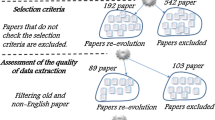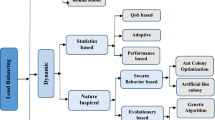Abstract
A problem of allocating resources of a grid to workflow applications is considered. The problem consists, generally, in allocating distributed grid resources to tasks of a workflow in such a way that the resource demands of each task are satisfied. Grid resources are divided into computational resources and network resources. Computational tasks and transmission tasks of a workflow are distinguished. We present a model of the problem, and an algorithm for finding feasible resource allocations. A numerical example is included, showing the importance of the resource allocation phase on a grid. Some conclusions and directions for future research are given.
Similar content being viewed by others
References
Błażewicz, J., Ecker, K., Pesch, E., Schmidt, G., & Węglarz, J. (2001). Scheduling computer and manufacturing processes (2nd ed.). Berlin: Springer.
Błażewicz, J., Ecker, K., Pesch, E., Schmidt, G., & Węglarz, J. (2007). Handbook on scheduling: from theory to applications. Berlin: Springer.
Deelman, E., Blythe, J., Gil, Y., Kesselman, C., Mehta, G., Vahi, K., Blackburn, K., Lazzarini, A., Arbree, A., Cavanaugh, R., & Korranda, S. (2003). Mapping abstract complex workflows onto grid environments. Journal of Grid Computing, 1(1), 25–39.
Deelman, E., Blythe, J., Gil, Y., Kesselman, C., Mehta, G., Patil, S., Su, M. H., Vahi, K., & Livny, M. (2004). Pegasus: mapping scientific workflows onto the grid. In Proceedings of the 2nd European across grids conference, Nicosia, Cyprus (pp. 11–20).
Deelman, E., Blythe, J., Jain, S., Gil, Y., Vahi, K., Mandal, A., & Kennedy, K. (2005). Task scheduling strategies for workflow-based applications in grids. In Proceedings of the 5th IEEE international symposium on cluster computing and grid, Cardiff, UK (pp. 759–767).
Demeulemeester, E. L., & Herroelen, W. S. (2002). Project scheduling—a research handbook. Boston: Kluwer.
Foster, I., & Kesselman, C. (1999). Computational grids. In I. Foster & C. Kesselman (Eds.), The grid: blueprint for a new computing infrastructure (pp. 15–52). San Mateo: Morgan Kaufmann.
Foster, I., Voeckler, J., Wilde, M., & Zhao, Y. (2002). Chimera: a virtual data system for representing, querying, and automating data derivation. In Proceedings of the 14th conference on scientific and statistical database management, Edinburgh, UK (pp. 37–46).
Józefowska, J., & Węglarz, J. (2006). Perspectives in modern project scheduling. New York: Springer.
Kurowski, K., Nabrzyski, J., & Pukacki, J. (2001). User preference driven multiobjective resource management in grid environments. In Proceedings of cluster computing and the grid conference, 15–18 May 2001, Australia (pp. 114–122).
Kurowski, K., Nabrzyski, J., Oleksiak, A., & Węglarz, J. (2003). Multicriteria aspects of grid resource management. In J. Nabrzyski, J. Schopf & J. Węglarz (Eds.), Grid resource management: state of the art and future trends (pp. 271–293). Boston: Kluwer.
Kurowski, K., Nabrzyski, J., Oleksiak, A., & Węglarz, J. (2006). Grid multicriteria job scheduling with resource reservation and prediction mechanisms. In J. Józefowska & J. Węglarz (Eds.), Perspectives in modern project scheduling (pp. 345–373). New York: Springer.
Kurowski, K., Nabrzyski, J., Oleksiak, A., & Węglarz, J. (2008). Multicriteria approach to two-level hierarchy scheduling in grids. Journal of Scheduling, 11(5), 371–379.
Leung, J. Y.-T. (2004). Handbook of scheduling: algorithms, models, and performance analysis. London, Boca Raton: Chapman & Hall/CRC.
Mika, M., Waligóra, G., & Węglarz, J. (2003). A metaheuristic approach to scheduling workflow jobs on a grid. In J. Nabrzyski, J. Schopf & J. Węglarz (Eds.), Grid resource management: state of the art and future trends (pp. 295–318). Boston: Kluwer.
Nabrzyski, J., Schopf, J., & Węglarz, J. (2003). Grid resource management: state of the art and future trends. Boston: Kluwer.
Szalay, A. S., Kunszt, P. Z., Thakar, A., Gray, J., Slutz, D., & Brunner, R. J. (2000). Designing and mining multi-terabyte astronomy archives: the Sloan Digital Sky Survey. SIGMOD Record, 29, 451–462.
Wulz, C.-E. (1998). CMS concept and physics potential. Proceedings of the American Institute of Physics Conference, 444(1), 467–478.
Węglarz, J., Józefowska, J., Mika, M., & Waligóra, G. (2010). Project scheduling with finite or infinite number of activity processing modes—a survey. European Journal of Operational Research (to appear).
Author information
Authors and Affiliations
Corresponding author
Rights and permissions
About this article
Cite this article
Mika, M., Waligóra, G. & Węglarz, J. Modelling and solving grid resource allocation problem with network resources for workflow applications. J Sched 14, 291–306 (2011). https://doi.org/10.1007/s10951-009-0158-0
Published:
Issue Date:
DOI: https://doi.org/10.1007/s10951-009-0158-0




